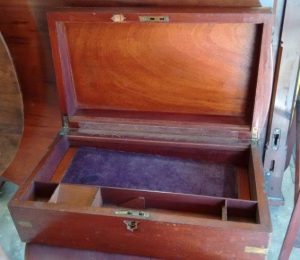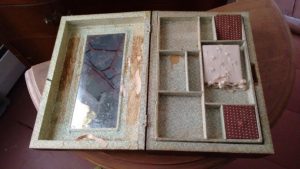 As a member of my local historic preservation commission, as well as my family’s de facto family historian and custodian of All Things Family Memorabilia, I often encounter the decision of what to preserve, what to donate or sell, and what to demolish. Historic preservation of buildings is a complex and sometimes contentious topic best left for other writers. But what about all those smaller treasures our ancestors left for us, assuming that we would value them, cherish them, and preserve them as they had (even if we don’t know what or who they are)?
As a member of my local historic preservation commission, as well as my family’s de facto family historian and custodian of All Things Family Memorabilia, I often encounter the decision of what to preserve, what to donate or sell, and what to demolish. Historic preservation of buildings is a complex and sometimes contentious topic best left for other writers. But what about all those smaller treasures our ancestors left for us, assuming that we would value them, cherish them, and preserve them as they had (even if we don’t know what or who they are)?
I recently sought expert advice on restoring an antique wooden writing box (shown above) and a partitioned wooden sewing box. The writing box, of 1820s vintage, is in very good condition for its age even though it lacks the brass shield on the top and at the keyhole as well as the latch securing the writing surface. The interior linen and velvet hinge has parted company with its other half, and a small piece of veneer has become a splinter.
I don’t know who owned it, only that it came out of my great-great-great-great-grandfather’s homestead. Given its age, I suspect it belonged to my great-great-great-grandmother, Experience Read Cony (1802–1886), or her husband, Capt. John Cony (1803–1876). For some families, its condition alone might warrant disposal as much as restoration, and the lack of verified provenance would guarantee it.
 The sewing box also came from that same house, specific owner also unknown, and boasts fabric-lined sections. Attached under the mirror is a scrap of paper with “1857” written on it. Of the women living in that house during the 1850s through the 1860s, Experience Read Cony or her daughter-in-law, Mary Ann Stone Cony (1840–1927), could have owned it.
The sewing box also came from that same house, specific owner also unknown, and boasts fabric-lined sections. Attached under the mirror is a scrap of paper with “1857” written on it. Of the women living in that house during the 1850s through the 1860s, Experience Read Cony or her daughter-in-law, Mary Ann Stone Cony (1840–1927), could have owned it.
I have come to understand that not everything old needs saving, but not everything old needs to be destroyed to make way for newer, more contemporary versions. While intellect analyzes condition, provenance, value, usefulness, and costs, emotion sometimes overrides the analysis and common sense. How many of us view our deceased ancestors’ possessions as trash to be removed to “clean out the house for sale?” On the other hand, how many of us stuff our own houses with those same possessions with the intention of “sorting through them someday,” a day that may never come? Are we then procrastinating or preserving? Does it matter?
I have come to understand that not everything old needs saving, but not everything old needs to be destroyed to make way for newer, more contemporary versions.
I think not. From my own experience, such decisions made in haste are usually wrong, and prompt later regrets. While I have saved and attempted to preserve and restore many things, I’ve also given away or discarded items I later realized were things valuable to the stories of my family’s history. I believe it is better to take the time to understand the history behind the artifact, as well as its provenance, before deciding whether to remove it or restore it.
Perhaps the Swedish idea of “death cleaning” – i.e., decluttering before death to reorganize and make life easier with less “stuff” – provides time to reflect on those items, time to savor their meaning and sentiments, and time to be sure the decision to save or discard is the correct one for all. Paving Paradise to make a parking lot applies to more than urban spaces; it also applies to settling the question of what to do with all that “family stuff.”
As for the writing box and the sewing box, I’ll have them restored in spite of the objections of my checkbook. There are those in my family who will value, love, and use them again for their original intended purposes, to be enjoyed simply for what they are: a nice, really old, wooden writing box and a sewing box. No parking lot this time, just two things lost, two things found.
Thank you for this article. My husband’s dad passed away in Feb. in New York. My husband is the only living son, and no living siblings of my father-in-law. His small neat house had storage that was packed with family memorabilia. Items from Sweden from 1860-1890s. Items from both his wife and his parents, grandparents and gr. grandparents. Some items my husband knew the history of, others he had no clue. Living almost 1,000 miles away, we made many trips back and forth. My husband’s first inclination was to just put it all in Estate Sale. He finally realized there were too many memories there, so we packed up many tubs and boxes to bring home. We still had a large estate sale, and there were still items we would have liked to keep, but our home was already filling up. We will spend the next year or so going thru these tubs of memories and trying to figure out how to properly sell, or who may want. But several memories are staying with us. I am sure in time he will be glad he kept some of it.
At the time of “death cleaning,” one can and should also pass on to others the meaning of those things that are kept, ideally to the eventual heir or at least in a note left with the object. My mother often commented on finding out what one of her heirs would want without actually doing it. As her executor, I should have probed for the meaning of things important to her.
My father-in-law said his sister had some items of family memorabilia. A couple of years after her death, I inquired about them, especially photos going back to the great-grandfather who fought in the Civil War. My husband’s first cousin told us that his step-father had thrown them out because he “didn’t know who those people were.” This is a major reminder to identify people on photos, AND to ask if anyone wants them.
In another instance, a deceased cousin gave us a few china items. This time there was an old note, which said they were “Grandma’s.” WHICH grandmother? Was this written by the cousin or her mother, therefore Grandma was really great grandmother?
My own family might be thinking that I’m nuts, but each time they visit, I tell them the history of one or more of the family items that we have — and I promise, I’m going to write it down, with NAMES of the people who had owned them.
My aunt passed some items on to me, but couldn’t tell me the history behind them – only that her Aunt May gave them to her. I have an ivory fan, an old gentleman’s wallet someone wrote 1700 on, 2 beaded purses, old eyeglasses with cases, old diaries (oldest 1862), a couple of old Bibles, photos, and an autograph book. I don’t want to throw them away, but I am quite sure my daughters don’t want them either, and none of my nieces and nephews have expressed an interest in family history. I am thinking of making a trip up to New York State and visit several local museums and historical societies to find a place for them. Of course, I’m going to photograph and scan all of the items, and digitize the diaries and autograph book before I give them to the repositories. I have already scanned and uploaded the photos to Ancestry.
I had several family heirlooms; a copy of a Chippendale mirror originally made by a great-great grandfather (the copy made by my grandfather’s brother for my grandparents anniversary), jewelry and silver hand mirror of my great grandmother, coin silver spoons from her mother and several other things. I identified the provenance of each and gave to my children several years ago to both declutter my house and to ensure that my children knew the history of each. Now I no longer have the responsibility of these heirlooms and my children will have less to sort through when I depart this earth.